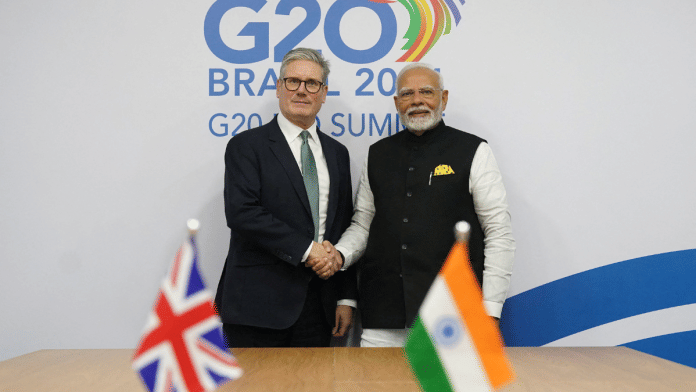Thank you dear subscribers, we are overwhelmed with your response.
Your Turn is a unique section from ThePrint featuring points of view from its subscribers. If you are a subscriber, have a point of view, please send it to us. If not, do subscribe here: https://theprint.in/subscribe/
India and the United Kingdom are set to sign a comprehensive Free Trade Agreement (FTA) during Prime Minister Narendra Modi’s next visit to London on July 23-24, 2025. It will mark a significant step towards redefining bilateral relations in a multipolar world. This accord, which has been under negotiation for over three years, is expected to redefine the economic, scientific, and strategic stance between the two countries.
The FTA will signal a shift from previous controversial asymmetries between the two countries, which are strategically moving towards a partnership built on mutual trust.
Source: Civils Daily
The Present: What will this FTA deliver?
The agreement highlights major tariff reductions. It will provide the UK with progressive cuts on Scotch whisky tariffs from 150% to 75% immediately, eventually reducing to 40%.
Parallelly, India will lower car tariffs from 100% to 10% under a quota system and is expected to gain duty-free or preferential access on nearly 99% of its export lines, including textiles, leather goods, engineering products, and gems.
Beyond commodities, the FTA addresses professional mobility as UK would grant a three-year national insurance waiver for Indian IT and skilled professionals. It will significantly reduce costs for Indian firms and enable smoother talent movement across sectors. The agreement will not only expand trade but will also accelerate cooperation under the India-UK Roadmap 2030, with a focus on emerging technology, defence, fintech, and climate collaboration, reflecting a multifaceted commitment to long-term partnership.
The Past: From colonial trade imbalance to economic agency
India and the UK shares a complex history that has profoundly influenced their early trade relations. During British colonial rule, India was assigned the role of a mere supplier of raw materials wherein British continued to exploit India’s abundant resources while inundating its markets with British-manufactured goods. These dynamic fostered deep economic imbalances that lingered long after 1947.
Nevertheless, after 1947, India embarked on a journey of self-reliance, implementing protectionist policies that emphasised import substitution and the development of domestic industries. Meanwhile, the UK shifted its trade focus toward Europe, aligning itself with the European Economic Community and later the European Union.
India’s bold steps towards liberalization during the watershed moment of 1991 resulted to be a significant turning point that led to a gradual increase in bilateral trade, particularly in the burgeoning services and technology sectors. However, the seismic shift of Brexit in 2016 rekindled the UK’s interest in forging robust trade relations beyond the EU, positioning India as an indispensable economic and strategic ally on the world stage.
In January 2022, the two countries started formal negotiations that comprised of 26 chapters across goods, services, investments, intellectual property, and mobility. Issues around high tariffs on whisky and cars, concerns over labour mobility, and social security agreements created negotiation hurdles. Yet, a shared vision of strategic alignment and economic opportunity helped both countries navigate these challenges.
Source: The Statesman
The Future: Economic potential and strategic alignment
By 2040, the UK expects its GDP to grow by £4.8 billion a year. Tariff reductions are also expected to save British companies up to £900 million a year. The agreement is anticipated to foster regulatory coherence in industries like financial services, green technology, and medicines in the medium run, facilitating more seamless investment flows and collaborations on innovation. It will encourage joint ventures in sectors where both countries have complementary strengths, such as digital trade, semiconductors, and sophisticated manufacturing.
Strategically, the FTA gives the UK an indispensable footing in the Indo-Pacific area while fortifying India’s place in global supply networks. The agreement also aligns with broader geopolitical objectives, ensuring that both nations can collectively address challenges in climate change, cybersecurity, and resilient infrastructure.
A defining moment for India–UK ties
The said FTA indicates not just a method for trade facilitation but a crucial rethinking of India-UK relations, changing a historical context marked by colonial trade hierarchies into a future based on mutual benefits. This agreement will establish a precedent for how countries can convert historical challenges into structures for collective prosperity.
With the official signing approaching, the India-UK FTA represents a pivotal moment in global trade diplomacy, indicating that practical economics and innovative cooperation can triumph in an increasingly divided world.


